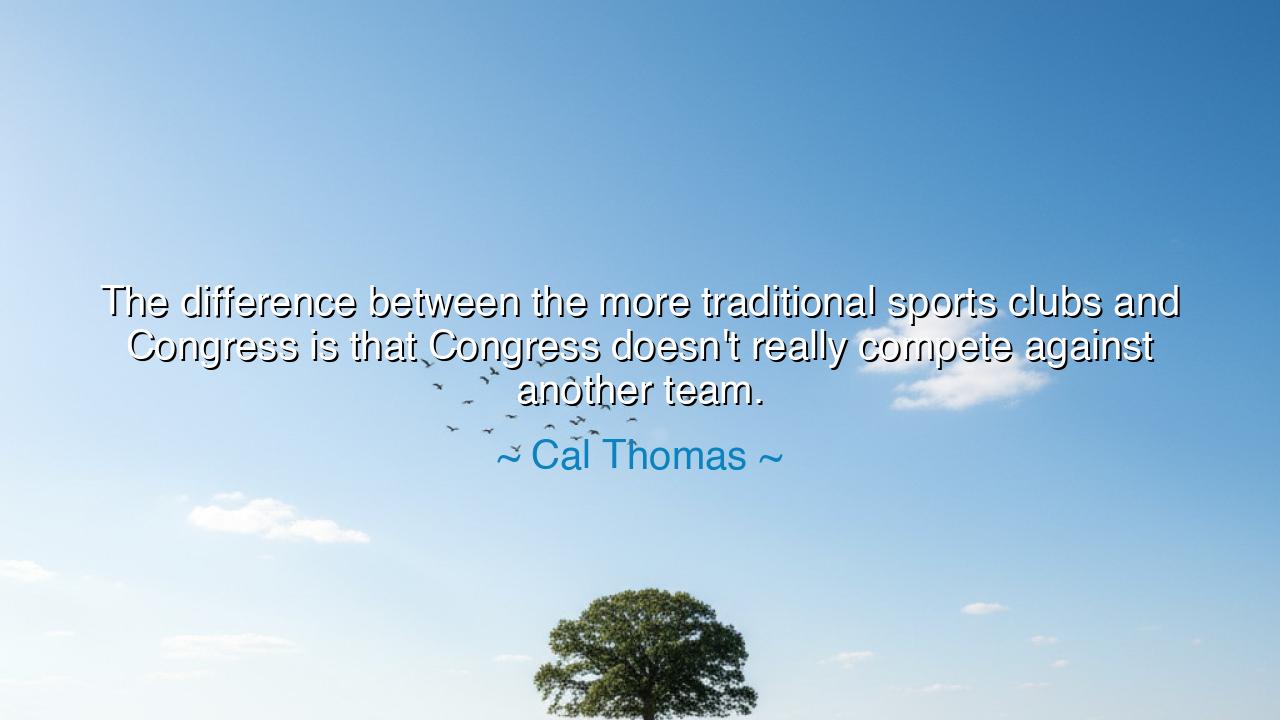
The difference between the more traditional sports clubs and
The difference between the more traditional sports clubs and Congress is that Congress doesn't really compete against another team.






Hear the sharp and satirical wisdom of Cal Thomas, who declared: “The difference between the more traditional sports clubs and Congress is that Congress doesn’t really compete against another team.” At first, this appears a jest, an offhand criticism of politics. Yet in truth, it strikes at the very essence of governance and the peril of power without true opposition. For sports clubs, though fierce in their rivalries, are bound by clear rules, equal playing fields, and the measure of victory or defeat. But Congress, Thomas reminds us, is a place where the game itself is bent, where the opposition is not always a rival, but sometimes the people themselves, whose welfare is too often sacrificed in struggles for power.
The meaning of his words lies in the contrast between competition and accountability. In sports, the outcome is decided by effort, skill, and teamwork; every failure is visible, every loss undeniable. There is no hiding from the scoreboard. Yet in Congress, there is no final whistle, no season-ending tally, no true rival to expose defeat. When leaders fail, they often cloak it in speeches, delays, or shifting of blame. Without the discipline of external victory and loss, the contest becomes not about serving the people, but about sustaining the self.
The origin of this wisdom is ancient. In Athens, the birthplace of democracy, the citizens understood that leaders must always be held accountable, for unchecked power corrupts. They instituted the practice of ostracism, by which the people could exile a leader deemed too powerful or corrupt. In Rome, senators were meant to be guardians of the republic, yet as their accountability waned, ambition consumed them, and the republic fell to empire. Thomas echoes this eternal warning: that where leaders are not bound by the discipline of true competition, decay and arrogance take root.
Consider the story of the Roman Senate in the final years of the Republic. Senators debated endlessly, scheming for personal gain, while armies marched at the command of generals who answered more to ambition than to law. Unlike soldiers on a battlefield or athletes on a field, these men had no true opponents but their own appetites, and so the Republic collapsed under the weight of its own corruption. Just as Thomas warns, when there is no “other team,” the game of politics becomes a contest of shadows, where the people suffer as pawns.
The lesson is clear: structures of power must be tempered by accountability. Just as sports clubs are measured by the scoreboard, so too must rulers be measured by their service to the people. Without this, politics turns inward, a self-sustaining struggle that no longer seeks the good of the many, but only the survival of the few. We must not be deceived by words alone; we must demand results, truth, and responsibility.
Practical actions must follow. As citizens, do not be content to watch the spectacle as though it were a game with no stakes. Demand transparency as one demands a scoreboard. Hold leaders accountable, as referees hold athletes to rules. Celebrate not those who speak the loudest, but those who serve with integrity. And remember always that democracy, like sport, depends on the active participation of its people—without spectators who care, the contest loses its meaning.
And so, child of tomorrow, take heed of Cal Thomas’s wisdom. Sports clubs compete for victory, but Congress often competes only with itself, and therein lies the danger. Do not let those who lead you play a game without rivals or rules. Be the voice, the judge, the force that demands accountability. For in the end, the health of a republic depends not on the power of its rulers, but on the vigilance of its people, who must always remind their leaders: you do not play for yourselves—you play for us all.






AAdministratorAdministrator
Welcome, honored guests. Please leave a comment, we will respond soon